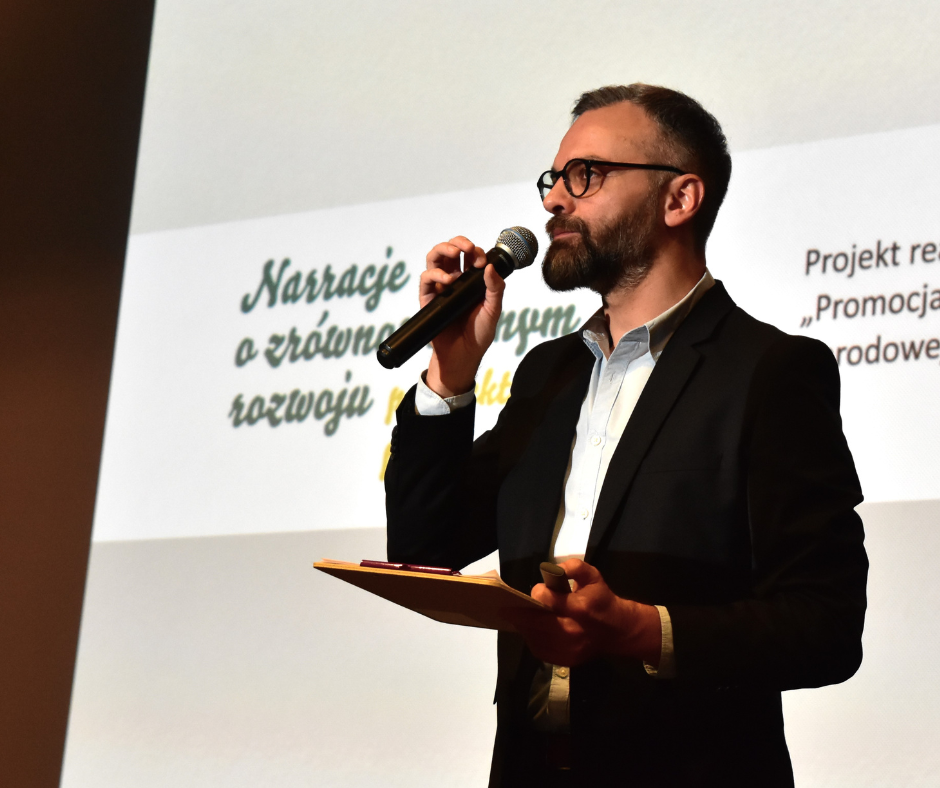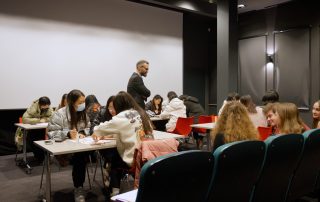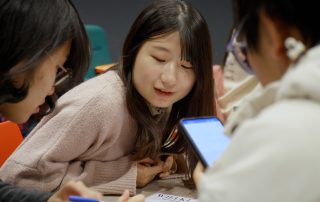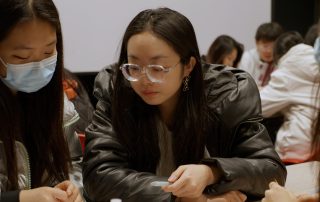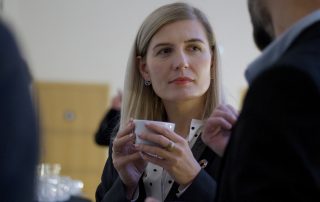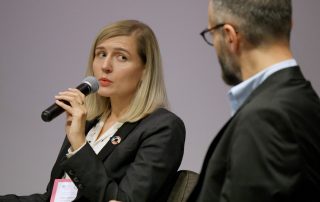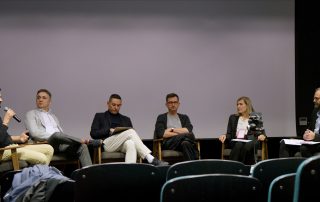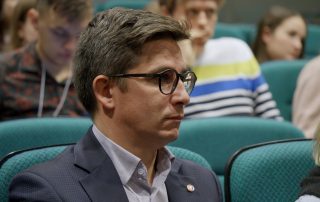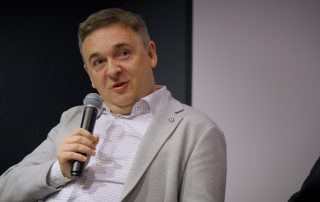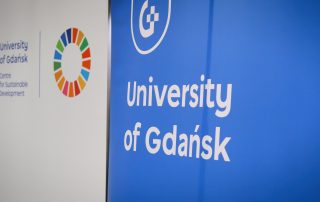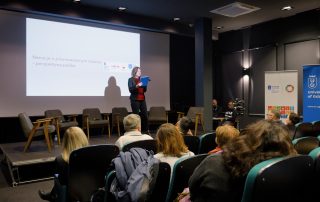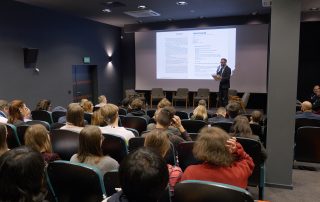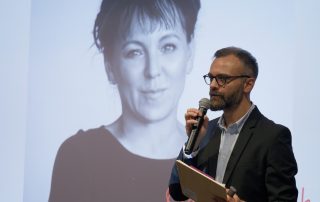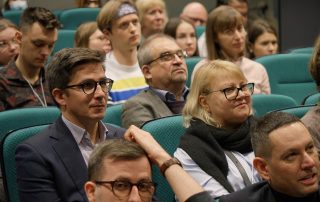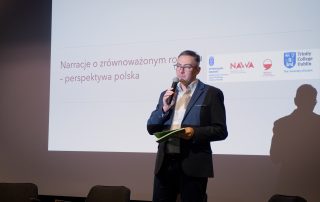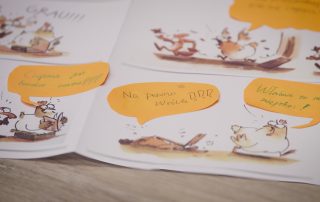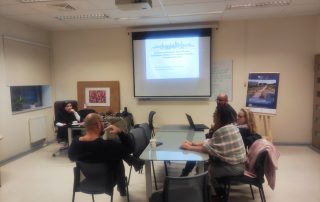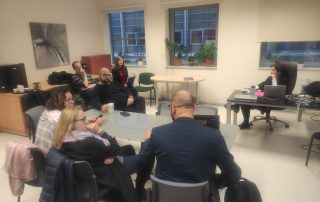The second day (25th November 2022) of the international conference Science and Education for Sustainable Development began with a visit by event participants to the Emigration Museum in Gdynia. Guests listened to a presentation of the project Narratives of Sustainable Development – a Polish perspective and a panel discussion Sustainable Polish? Narratives of Sustainable Development.
Photos: Michał Śmierzchalski
Participants on the second day of the conference included students from Trinity College Dublin, Chinese students from Harbin studying Polish Studies at the University of Gdansk and students from TUFS in Japan.
Guests at the Emigration Museum in Gdynia were welcomed by Sebastian Tyrakowski – Deputy Director of the Museum.
The first item on the agenda was a presentation of the project Narratives of Sustainable Development – A Polish Perspective. The guests then had the opportunity to listen to a panel discussion Sustainable Polish? Narratives of Sustainable Development, with the participation of Prof. Przemysław Gębal (University of Gdańsk), Dr. Irena Chawrilska (University of Gdańsk), Dr. Michał Pruszak (University of Gdańsk), Maksymilian Bochenek (Emigration Museum in Gdynia), Marek Pandera (Trinity College University in Dublin) and Wojciech Stachura (Miniatura Theatre).
The panellists convinced the audience that today, cultural activities carried out in museums, theatres, during the study of Polish or any other language and culture can be a tool for change in local and multicultural communities to raise their awareness of sustainable development goals.
The international students also had the opportunity to participate in a workshop on text editing. The results were short stories based on picture stories.
We were also honoured by the presence of representatives of the National Agency for Academic Exchange: Mariusz Czech (Director of NAWA Polish Language Programmes Office) and Wieslawa Krasuska (NAWA).
The project “Narratives of Sustainable Development – Poland’s Perspective” is funded by NAWA within the framework of the Polish Language Promotion Program. The project is carried out in cooperation with Trinity College Dublin, University of Dublin.
The visit to the Emigration Museum was concluded with a guided tour of the exhibition. Guests had the option of choosing a group in Polish or English.
After the visit to the Museum, the guests were taken by bus back to the Oliwa campus of the University of Gdansk, where the final panel of the conference Sustainable development in research took place at the Faculty of Social Sciences.
During the panel, the following academics from UG and other universities presented their papers: dr hab. Arkadiusz Modrzejewski, prof. UG (a paper on the normative approach in political science as an element of sustainable development of science and higher education), dr hab. Sylwia Mrozowska, prof. UG (a paper on the role of wind energy in the energy transition in Poland), dr hab. Anita Adamczyk, prof. UAM (analysed research on the concept of the climate migrant), dr Dorota Kowalewska from the University of Szczecin (paper on Ukrainian refugees with disabilities and their situation in Poland), dr Krzysztof Szczepaniak from the University of Gdańsk (paper on effectiveness in achieving sustainable development goals at the local level), dr Magdalena Markiewicz from the University of Gdańsk (lecture on the social responsibility of universities and the social responsibility of business), Weronika Kamińska from the University of Gdańsk (talked about the role of sustainable development in sociological research on the example of patients under hospice care), dr Irena Chawrilska, from the University of Gdańsk (outlined a vision of the future of the humanities in the context of health, the environment and society), dr Elżbieta Czapka, from the University of Gdańsk (challenges related to migration research), dr Barbara Kijewska, and dr Dawid Weisbrodt (presented a perspective on how teachers and students perceive the environmental crisis in the context of methodological challenges), and Bartosz Duraj from the University of Gdańsk (analysed determinants of the energy transition in Poland).
With this, the two-day international conference Science and Education for Sustainable Development has come to an end. We would like to thank all our guests for such a large and active participation!
The International Scientific Conference “Science and Education for Sustainable Development” is co-funded by the Minister of Education and Science within the framework of the “Excellent Science” program.


